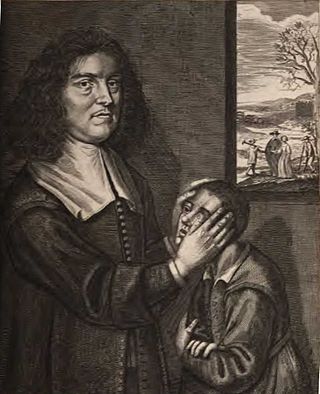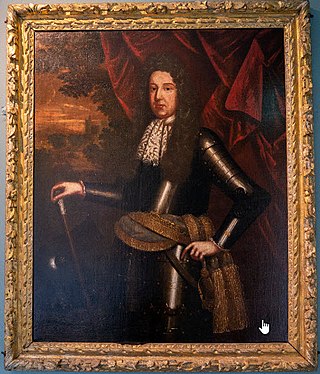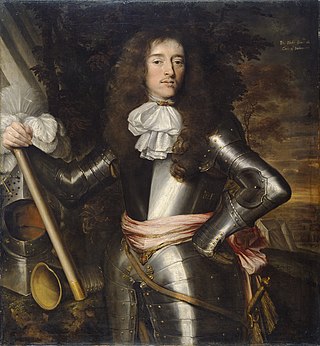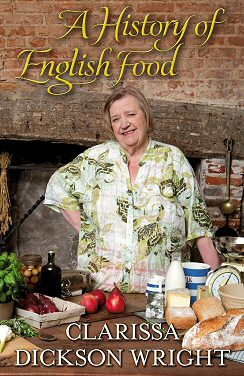Related Research Articles
The Lord High Chancellor of Ireland was the highest judicial office in Ireland until the establishment of the Irish Free State in 1922. From 1721 to the end of 1800, it was also the highest political office of the Irish Parliament: the Chancellor was Speaker of the Irish House of Lords. The Lord Chancellor was also Lord Keeper of the Great Seal of Ireland. In all three respects, the office mirrored the Lord High Chancellor of Great Britain.

Lieutenant-General Michael Jones, c. 1606 to 10 December 1649, was an Irish-born soldier of Welsh descent who fought for Parliament and the Commonwealth in the War of the Three Kingdoms, primarily in Ireland. Third son of Lewis Jones, Bishop of Killaloe, his brothers Henry and Ambrose were both bishops in the Protestant Church of Ireland.

Sir John Keane, 5th Baronet, DSO was an Irish barrister and politician.

Valentine Greatrakes, also known as "Greatorex" or "The Stroker", was an Irish faith healer who toured England in 1666, claiming to cure people by the laying on of hands.

The practice of vegetarianism is strongly linked with a number of religious traditions worldwide. These include religions that originated in India, such as Hinduism, Jainism, Buddhism, and Sikhism. With close to 85% of India's billion-plus population practicing these religions, India remains the country with the highest number of vegetarians in the world.
Robert Cook may refer to:

Sir Donough MacCarty, 1st Earl of Clancarty (1594–1665), was an Irish soldier and politician. He succeeded his father as 2nd Viscount Muskerry in 1641. He rebelled against the government and joined the Irish Catholic Confederation, demanding religious freedom as a Catholic and defending the rights of the Gaelic nobility. Later, he supported the King against his Parliamentarian enemies during the Cromwellian conquest of Ireland.
Events from the year 1783 in Ireland.

The earliest records of vegetarianism as a concept and practice amongst a significant number of people are from ancient India, especially among the Hindus and Jains. Later records indicate that small groups within the ancient Greek civilizations in southern Italy and Greece also adopted some dietary habits similar to vegetarianism. In both instances, the diet was closely connected with the idea of nonviolence toward animals, and was promoted by religious groups and philosophers.
Philip Gray was an Irish republican, revolutionary and a member of the Irish Confederation. He took part in the Risings of 1848 and 1849 along with James Fintan Lalor and both James Stephens and John O'Mahony, who would go on to establish the Irish Republican Brotherhood in Ireland and the Fenian Brotherhood in the United States.

Roger Yates is an English lecturer in sociology at University College Dublin and the University of Wales, specialising in animal rights. He is a former executive committee member of the British Union for the Abolition of Vivisection (BUAV), a former Animal Liberation Front (ALF) press officer, and a co-founder of the Fur Action Group.
William Cooke Taylor (1800–1849) was an Irish writer, known as a journalist, historian and Anti-Corn Law propagandist.

Ardfinnan Castle, is the sister castle of Lismore Castle and was built circa 1185 to guard the river crossing at Ardfinnan in County Tipperary, Ireland. It is situated on the River Suir, seven miles west of Clonmel. The castle is currently privately owned and is not open for public viewing.

Murrough MacDermod O'Brien, 1st Earl of Inchiquin, was an Irish nobleman and soldier, who came from one of the most powerful families in Munster. Known as Murchadh na dTóiteán, he initially trained for war in the Spanish service. He accompanied the Earl of Strafford into Leinster on the outbreak of the Irish Rebellion of 1641 and was appointed governor of Munster in 1642. He had some small success, but was hampered by lack of funds and he was outwitted by the Irish leader, Viscount Muskerry, at Cappoquin and Lismore. His forces dispersed at the truce of 1643.
Sheriff of Dublin City was a judicial and administrative role in Ireland. Initially, the Sovereign's judicial representative in Dublin, the role was later held by two individuals and concerned with a mix of judicial, political and administrative functions. In origins, an office for a lifetime, assigned by the Sovereign, the Sheriff became an annual appointment following the Provisions of Oxford in 1258.

Rynn Berry was an American author and scholar on vegetarianism and veganism, as well as a pioneer in the animal rights and vegan movements.
Sir Richard Musgrave, 3rd Baronet was an Irish baronet and politician.

A History of English Food is a 2011 non-fiction book, a history of English cuisine arranged by period from the Middle Ages to the end of the twentieth century, written by the celebrity cook Clarissa Dickson Wright and published in London by Random House. Each period is treated in turn with a chapter. The text combines history, recipes, and anecdotes, and is illustrated with 32 pages of colour plates.

Reasons for Not Eating Animal Food is an 1814 pamphlet on vegetable diet, which was written by Sir Richard Phillips. It was originally written in 1811, and published multiple times by the author.
References
- ↑ "Cooke Cook, Robert called Linen Cooke". Oxford Dictionary of National Biography. Retrieved January 30, 2020.
- 1 2 3 Coke, Roger. (1697). A Detection of the Court and State of England During the Four Last Reigns. Bell. p. 664
- 1 2 3 Cooper, Thompson. (1887). Cook, Robert (1646?-1726?). In Dictionary of National Biography, 1885-1900, Volume 12. p. 74
- ↑ O'Sullivan, Melanie; McCarthy, Kevin M. (1999). Cappoquin: A Walk Through History. Cappoquin Development Company. p. 102
- ↑ Lee, Sidney. (1906). Dictionary of National Biography. New York: The Macmillan Company. p. 273
- 1 2 3 Somerville-Large, Peter. (1975). Irish Eccentrics: A Selection. Hamish Hamilton. p. 12
- ↑ Smith, Charles. (1774). The Ancient and Present State of the County and City of Waterford. Dublin. p. 371
- 1 2 3 Wilson, Charles Henry. (1813). Anecdotes of Eminent Persons, Volume 2. pp. 196-200
- ↑ Shaw, Karl. (2004). Book of Oddballs and Eccentrics. Book Sales. p. 411
- 1 2 3 Bohan, Rob. (2010). Irish Lives. The Irish Times . Retrieved January 30, 2020.
- 1 2 Madden, R. R. (1847). Some notices of the Irish mesmerists of the seventeenth century Greatrakes, Cook and Finaghty. Dublin Quarterly Journal of Medical Science 4: 254–272.
- ↑ Leyland, Simon. (2019). Robert Cook (1646-1726). In The Men Who Stare at Hens: Great Irish Eccentrics, from WB Yeats to Brendan Behan. The History Press. ISBN 978-0750989275
- ↑ Thomas, Keith Vivian. (1983). Man and the Natural World: A History of the Modern Sensibility. New York: Pantheon Books. p. 291. ISBN 0-394-49945-X